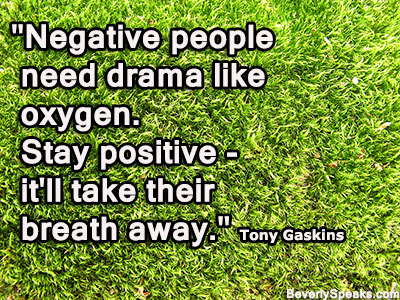 Difficult people are everywhere.
Difficult people are everywhere.
Angry people. Disagreeable People. Cranky People. Rude People.
They bring their toxicity into your space and you’re suddenly overwhelmed with the noxious fumes of negativity. What do you do? How are you going to respond?
Some of that may be determined by their relationship to you. But there is a certainty of the LEAST effective way to respond. And that’s to get offended.
Easier said than done. How do you resist becoming offended? When someone is ranting and hurling insults at you, how do you you stay calm?
How to Bring Out the Best in People at Their Worst
1. Ask questions and listen to what is NOT being said. If someone is livid, chances are that 90% of their frustration isn’t even about you. Consider what burdens they are carrying and what might have lit their fuse before you even entered the picture.
2. Validate the other person. Active listening is one way to validate another. Using the age old, “feel, felt, found” is still a way to touch someone through communication.
3. Courageous communication is an art. It involves honesty and a willingness to be forthright about the heart of the matter. Speaking the truth from a spirit of love is powerful. “Most people need love and acceptance a lot more than they need advice.”—Bob Goff
4. Relinquish the need to be right. That’s a tough thing to do – especially if you ARE right. *Grin* Sometimes relationships are more valuable than winning.
5. Decrease the intensity of the exchange. One way to do this is to physically step back. Agreeing to take a break and come back to the discussion when you are both calm can prevent a lot of storm damage.
These 5 techniques are basic and effective. Complex strategies aren’t likely to remain in the front of your brain when tension is running high.
It should go without saying that emotionally charged discussions should NOT take place via email, texting, FaceBook or any other digital format. The ideal way to handle a difficult interaction is face to face. The phone is the second choice. Resolving conflict is hard work, but the dividends are rich. Making an investment in enduring relationships may seem expensive, but it will keep you out of the hole.
Resist becoming the difficult person by choosing to keep the lines of communication open. Cutting people out of our hearts and lives is rarely the best way to handle a difficult relationship. It’s almost as if we don’t learn the lesson well, we get another person to practice with. Look for the lessons in the hard stuff so you can get promoted to the next lesson!
A few nuggets I’ve learned in the hard places:
Offense bristles and separates people.
Arrogance blames.
Patience and humility are willing to take responsibility. (Even if this is as basic as the responsibility to try.)
Putting others first is a sign of character, not compromise.

Tricky and dicey business … I would guess [accurately 🙂 ] that I have fit in the category of “difficult” people more often than I care to own up to right now … so I am reading this from that perspective … and the place in me that hates being or feeling managed is having a bit of a cow right now 🙂 On another note, I generally ask myself where the “difficult” person in my space is reflecting something in me I’m not wanting to see … it puts the ownership ball in my court and allows me to authentically navigate the situation.
Love this! Great post, Bev! I shared it with some friends…and got to brag about you. 🙂
You’re one of those rare people that the very sound of their voice puts a smile on your face. So encouraging! 🙂
Thank you. It’s reciprocal as you just put a smile on mine.
Ah- I love your authenticity. Excellent perspective about discerning how the “difficult” person is mirroring something we need to deal with. This is particularly true when the difficulty is coming from someone really close to us. Think on this: “When you meet a difficult person, God is challenging you to bring a higher measure of good into their life than the difficulty they are bringing into yours. They are not there so that you can practice being an idiot. They are there for you to practice being Christ-like. They are there for you to practice the goodness of God in their life.” – Graham Cooke, The Art of Thinking Brilliantly. Love you, Deborah!
” Cutting people out of our hearts and lives is rarely the best way to handle a difficult relationship.” I agree–most of the time. But there are some relationships that need to be left behind.
Yes, Margaret, sadly, there are times when that is the only remaining option. But if it becomes a recurring theme, something is amiss.